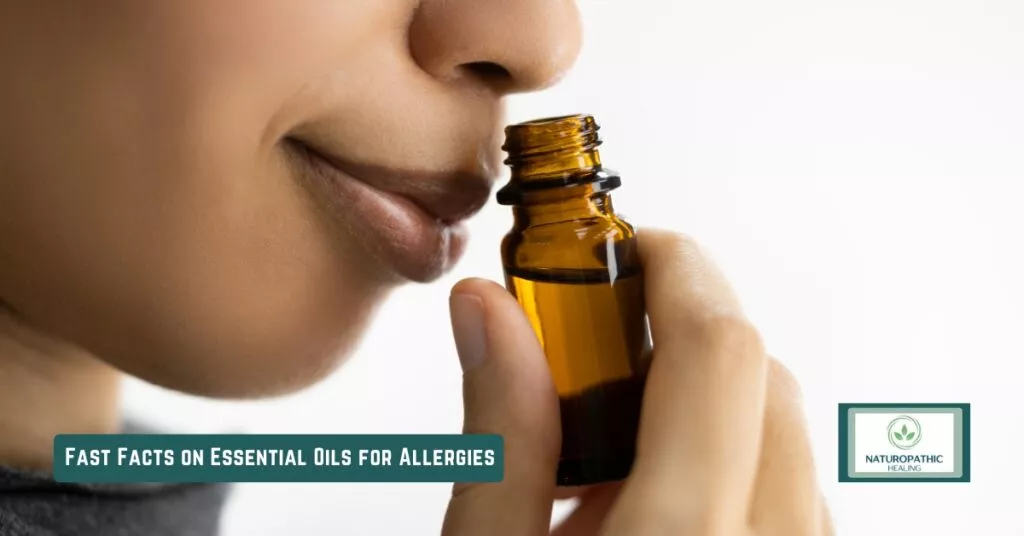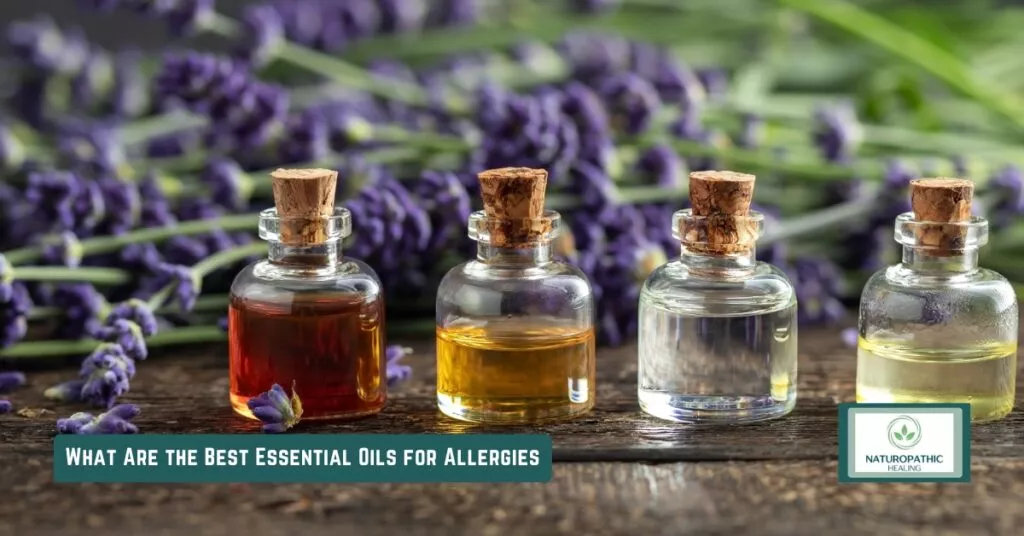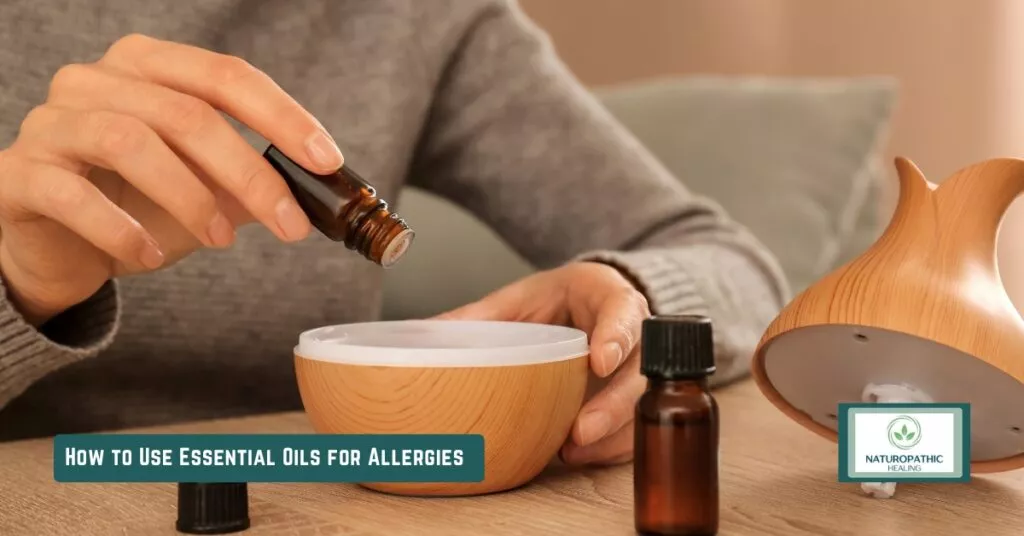As someone who has struggled with seasonal allergies for years, I understand the frustration that comes with constantly sneezing, itching, and feeling congested. While many over-the-counter and prescription medications can help alleviate allergy symptoms, some people prefer to use natural remedies like essential oils for allergies.
Essential oils are highly concentrated plant extracts that are known for their therapeutic properties. Many essential oils have anti-inflammatory, antihistamine, and decongestant properties, making them a popular choice for people looking for natural allergy relief. In this article, I will explore some of the most effective essential oils for allergies and how to use them safely.
Table of Contents
Fast Facts on Essential Oils for Allergies

As someone who suffers from allergies, I understand the frustration and discomfort that comes with it. Essential oils have become a popular remedy for allergies, and for good reason. Here are some fast facts on essential oils for allergies:
- Essential oils can help alleviate allergy symptoms such as congestion, runny nose, and itchy eyes. Peppermint, eucalyptus, and tea tree oil are known for their decongestant properties.
- Lavender and chamomile essential oils have anti-inflammatory properties that can help reduce inflammation caused by allergies.
- Lemon essential oil has antihistamine properties that can help reduce allergy symptoms.
- Essential oils can be used in a variety of ways, such as diffusing them in a room, applying them topically, or adding them to a bath.
- It’s important to do your research and choose high-quality essential oils from a reputable source to ensure their effectiveness and safety.
Overall, essential oils can be a natural and effective way to alleviate allergy symptoms. However, it’s important to consult with a healthcare professional before using essential oils as a treatment for allergies.
Recommended reading: Essential Oils: A Beginner’s Guide
What Are the Best Essential Oils for Allergies

As someone who has struggled with seasonal and skin allergies for years, I have found that essential oils can be a natural and effective way to alleviate symptoms. Here are some of the oils that I have found to be particularly helpful:
Peppermint
Peppermint oil is a popular choice for allergy relief due to its ability to open up nasal passages and reduce inflammation. It can be used topically or inhaled through a diffuser. However, it is important to dilute peppermint oil before applying it to the skin, as it can be irritating. Peppermint essential oil is recognized for its ability to diminish inflammation.
Frankincense
Frankincense oil has anti-inflammatory properties that can help reduce the symptoms of allergies. It can also be used to boost the immune system. You can apply it topically or inhale it through a diffuser.
Eucalyptus
Eucalyptus oil is another great option for allergy relief. Its anti-inflammatory and decongestant properties can help reduce nasal congestion and other allergy symptoms. It can be used topically or inhaled through a diffuser.
Lemon
Lemon oil has antihistamine properties that can help reduce the symptoms of allergies. It can also be used to boost the immune system. This oil can be applied topically or inhaled through a diffuser.
Lavender
Lavender oil has calming properties that can help reduce the anxiety and stress that often accompany allergies. It can also be used to reduce inflammation and relieve pain. This oil can be applied topically or inhaled through a diffuser.
Tea Tree Oil
Tea tree oil has antibacterial and anti-inflammatory properties that can help reduce the symptoms of allergies. It can also be used to boost the immune system. This oil can be applied topically or inhaled through a diffuser.
Chamomile Oil
Chamomile oil has anti-inflammatory properties that can help reduce the symptoms of allergies. It can also be used to calm the mind and promote relaxation. This oil can be applied topically or inhaled through a diffuser.
Overall, it is important to remember that while essential oils can be helpful in managing allergy symptoms, they should not be used as a substitute for medical treatment. It is always a good idea to consult with a healthcare professional before using any new products, especially if you have a pre-existing medical condition or are taking medication.
- Majestic Pure chamomile oil; premium quality; mixture of isolated compounds; packaged in the USA
How to Use Essential Oils for Allergies

As someone who suffers from allergies, I have found that essential oils can be a helpful natural remedy. Here are some ways to use essential oils for allergies:
- Diffusing: One of the easiest ways to use essential oils is by diffusing them. Simply add a few drops of your favorite essential oil to a diffuser and let it run for a few hours. This can help to cleanse the air and provide relief from allergy symptoms.
- Topical application: Essential oils can also be applied topically to provide relief from allergy symptoms. However, it is important to dilute the essential oil with a carrier oil before applying it to the skin. Some carrier oils include coconut oil, jojoba oil, and almond oil.
- Steam inhalation: Steam inhalation is another way to use essential oils for allergies. Simply add a few drops of essential oil to a bowl of hot water, cover your head with a towel, and inhale the steam for a few minutes. This can help open up your sinuses and relieve allergy symptoms.
- All-purpose cleaner: Essential oils can also be used as an all-purpose cleaner to help eliminate allergens in your home. Simply add a few drops of essential oil to a spray bottle filled with water and use it to clean surfaces throughout your home.
Remember, essential oils should never be used as a substitute for medical treatment. If you are experiencing severe allergy symptoms, it is essential to seek medical attention.
- Essential Oil Diffuser Set: this large home essential oil diffuser delivers aromatic scents in 10 different fragrances. Due to its versatility, we call diffusers for essential oils large room, diffuser for home, diffuser for room.
At A Glance – Best Essential Oils For Allergies
Below is a table summarizing information regarding some of the best essential oils for allergies:
| Essential Oil | Benefits | How to Use | Precautions/Considerations |
| Lavender | Soothes inflammation, eases congestion | Diffuse, inhale, and apply topically | Generally safe, may cause skin irritation in some |
| Peppermint | Relieves sinus congestion, clears airways | Diffuse, inhale, and apply topically | Dilute properly, avoid contact with eyes |
| Eucalyptus | Opens airways, relieves respiratory symptoms | Diffuse, inhale, steam inhalation | Not recommended for children under 6, can be toxic if ingested |
| Tea Tree | Anti-inflammatory fights respiratory infections | Diffuse, inhale, and apply topically | Dilute properly, avoid ingesting |
| Lemon | Clears sinuses, boosts immune system | Diffuse, inhale, and apply topically | Phototoxic: avoid sun exposure after topical application |
| Chamomile | Soothes skin irritation, eases allergy symptoms | Diffuse, inhale, and apply topically | Avoid if allergic to plants in the Asteraceae family |
| Frankincense | Reduces inflammation, boosts immune response | Diffuse, inhale, and apply topically | Generally safe, but may cause skin irritation |
Please note that while essential oils can provide relief for allergy symptoms, it’s essential to use them safely and in conjunction with other allergy management strategies. Also, individual reactions to essential oils can vary, so it’s advisable to perform a patch test before widespread use, especially if you have sensitive skin or pre-existing allergies. Consulting with a healthcare professional is recommended, especially if you have underlying health conditions or are pregnant.
Potential Risks and Side Effects
As with any natural or alternative remedy, there are potential risks and side effects associated with using essential oils for allergies. It is important to understand these risks before incorporating essential oils into your allergy treatment plan.
Firstly, essential oils can cause skin irritation or allergic reactions in some individuals. It is important to dilute essential oils properly before applying them topically and to perform a patch test before using a new oil. Additionally, some essential oils are phototoxic, meaning they can cause skin irritation or burns when exposed to sunlight or UV rays.
Ingesting essential oils can also be dangerous and should be avoided. Some oils can be toxic when consumed, and even small amounts can cause serious harm. It is important to only use essential oils for aromatherapy or topical application and never to ingest them.
Finally, essential oils can interact with medications and other treatments, so it is important to consult with a healthcare professional before using them. Pregnant or breastfeeding women, as well as individuals with certain medical conditions, should also exercise caution when using essential oils.
In summary, while essential oils can be a helpful tool for managing allergies, it is important to understand the potential risks and side effects associated with their use. By using essential oils safely and responsibly, individuals can incorporate them into their allergy treatment plan as a natural and effective alternative to traditional medications.



